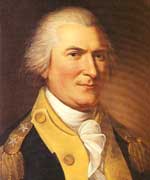
Amerikansk general, kommandant på Fort Ticonderoga, senere guvernør for Det nordvestlige Territorium.
- Fort Ticonderoga III, 1777
- Fort Recovery, 1791
Arthur St. Clair was born in Thurso, Caithness County, Scotland, on 23 March 1736 (old style); attended the University of Edinburgh briefly and later studied medicine under Dr. John Hunter in London; purchased a commission as ensign in Britain’s 60th Royal American Regiment and served in Canada under Generals Jeffrey Amherst and James Wolfe, 1757–1759; married Phoebe Bayard of Boston, 1760; resigned his British commission, 1762, and purchased an estate in the Ligonier Valley of Pennsylvania, 1764; commanded Fort Ligonier, 1767–1769; was appointed surveyor of the Cumberland District, 1770; was designated by Governor William Penn as agent of colonial government in his region, 1771; was a justice of Westmoreland County court; served as secretary to a congressional committee at the Treaty of Pittsburgh, 1775; was commissioned colonel in the Pennsylvania militia, 1775, and in the Continental Army, 1776, commanded the 2d Pennsylvania Battalion in abortive operations in Canada; was appointed brigadier general, 1776, and served with Washington’s forces in the battles of Trenton and Princeton, 1776–1777; was promoted to major general, 1777; was assigned to command of Fort Ticonderoga in June and abandoned it in July to a British investing force; was court-martialed and exonerated of blame for failing to hold the post, 1778; was present at the battle of Yorktown and served briefly with General Nathanael Greene in the South; left military service in 1783; was a Pennsylvania delegate to the Continental Congress, 1785–1787, and president of the Congress in 1787; was governor of the Northwest Territory 1787–1802, and administrator of Indian affairs there; was the senior officer of the United States Army, 4 March 1791–5 March 1792; led an expedition into Indian country and was disastrously defeated on the Wabash River, November 1791; resigned his commission in April 1792 and resumed the territorial governorship; was exonerated in a congressional inquiry from blame for the expedition’s failure; was removed, for political reasons, as territorial governor by President Jefferson, 1802; died at his Ligonier Valley home on 31 August 1818.